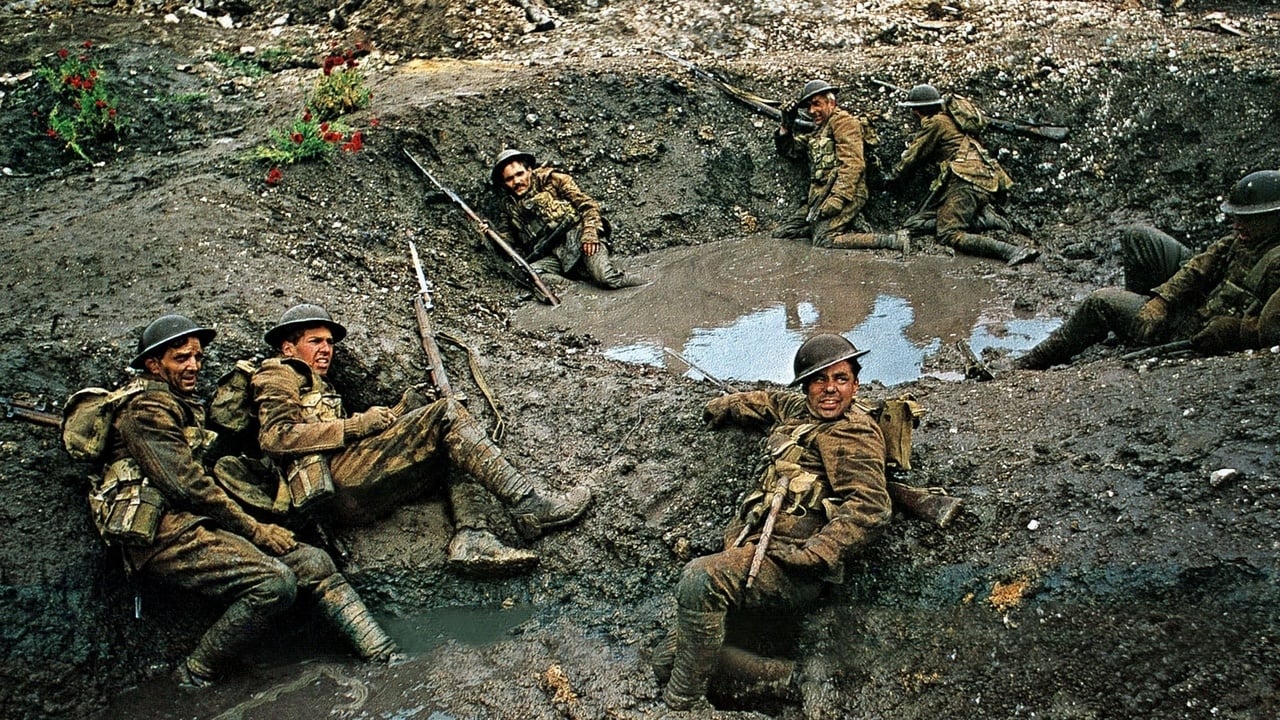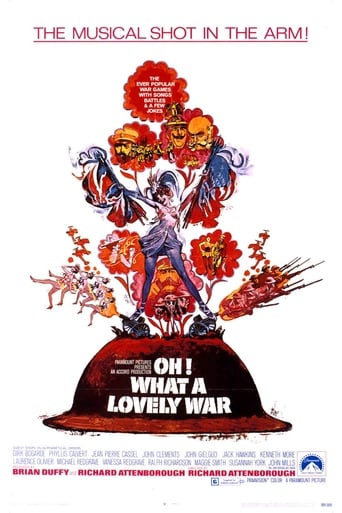



What makes it different from others?
n my opinion it was a great movie with some interesting elements, even though having some plot holes and the ending probably was just too messy and crammed together, but still fun to watch and not your casual movie that is similar to all other ones.
View MoreI am only giving this movie a 1 for the great cast, though I can't imagine what any of them were thinking. This movie was horrible
View MoreJust intense enough to provide a much-needed diversion, just lightweight enough to make you forget about it soon after it’s over. It’s not exactly “good,” per se, but it does what it sets out to do in terms of putting us on edge, which makes it … successful?
View MoreOH! WHAT A LOVELY WAR is Richard Attenborough's lavish, colourful, all-star-cast feature film version of the popular Broadway stage musical satire of WW1. It presents a heavily stylised look at the war, from its inception in the rivalries between various European dynasties, through to the massive toll on the armies of those taking part. It's an outlandish production that time and again hits the mark in skewering the craziness of the whole war, particularly focusing on the propaganda dished out to both the soldiers and those they left behind at home. The cast is incredible and features more big and small stars than you'd expect to see in a single movie. In the end, however, a musical lives or dies on the strength of the songs it contains, and this film's songs are very well written, highly catchy, and most of all, funny. The second half in particular features one song after another and it makes the running time just fly past.
View MoreThis is a superlative film. Though based on the Joan Littlewood stage play (itself derived from a Charles Chilton radio piece), the film has the creativity, visual sense and sardonic wit of Len Deighton throughout. Apparently, it also was Len who had the brainstorm to set the fantasy sections at Brighton, which worked brilliantly! Inexplicably, he asked for his name to be removed from the writing and producing credits. (Later, after swearing off the film industry, he got his revenge with his novel "Close-up.") Whatever "corporate changes" (in the sense of group-think) were made to his script, it still works. And it works extremely well. Not only as an anti-World War I piece, but as a powerful critique of the British class structure and the amoral diplomats and generals who sent millions, nearly a generation, to early graves. I can't think of another film that has so artfully blended satire, farce, tragedy and history. This film is "Dr. Strangelove" caliber, but it's a musical, using the patriotic tunes of the day with the sarcastic alternate lyrics that the troops themselves created.Kudos go to first-time director (now Lord) Richard Attenborough, and a stellar cast that was essentially the British Pantheon, circa 1969.I have never seen anything remotely like this, and I doubt if I ever will again. Emotional? If you don't have a few tears by the time they're playing "No, We'll Never Tell Them,"...better check for a pulse.
View MoreNow on DVD with additional features including comments from all the major players. An all time favorite film because of the satire and today its nothing new same old thing. Each War seems to be worse than the last-lessons are never learned. Its the rich versus the poor-the officers who only got their commissions because they were born privileged. The film is obviously Anti War and wastes no opportunity to make pointed comments at the Masters of War. The cavalier attitude to Death is emphasised when one leader reads out the figures of "Casualties-201447 privates and officers killed yesterday.Ground gained-NIL" This movie says more about the futility of War than any other
View MoreAttenborough's directing debut is patchy but impressive (even garnering a Directors Guild Award nod), immediately demonstrating his affinity for grandiose subjects; however, it was brave of him to go against the typically romantic view of British Imperialism (not that it was an isolated case during this time - witness the comparable military caricatures depicted in Tony Richardson's THE CHARGE OF THE LIGHT BRIGADE [1968] or, for that matter, Lindsay Anderson's irreverent expose' of the education system in IF... [1968]).The all-star cast assembled for the film looks extraordinary on paper but, actually, only a few of them are given substantial roles - Dirk Bogarde's contribution is especially insignificant if still amusing. I was under the impression that the musical numbers featured in the film were written for the stage show which inspired it: interestingly, they're really a collection of songs that were popular around the time of World War I - notably sarcastic ditties 'improvised' by the soldiers to take their minds off the grueling experiences on the battlefields; best of all, perhaps, is a sequence in which a popular hymn is sung simultaneously by a church gathering and an army troop (with the latter replacing the verses altogether to give it their typically cynical and anarchic perspective!).Production values are top-notch but the overall structure, though generally admirably transferred to the screen, remains somewhat disjointed - the film coming across too often as a series of revue sketches which alternate between the cheerfully jingoistic (Maggie Smith's stirring recruiting song), the broadly comic (as in the scenes involving John Mills' fanatical yet foolhardy Commander) and the immensely poignant (the wonderful sequence in which hostilities mutually cease over Christmas and the soldiers of both sides decide to meet in No Man's Land in order to share drinks and each other's company, not to mention the famous closing tracking shot over the endless graveyard), or else serve merely as expository passages (as in the recurring stylized pier scenes where the leaders of the various countries - among them Ralph Richardson, John Gielgud, Jack Hawkins and Ian Holm - are seen converging to examine the progress of the war).
View More